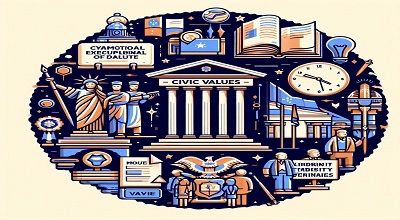Civic Values with Examples
Civic values are the principles and beliefs that guide individuals in their interactions with their community, society, and government. These values are essential for a healthy and well-functioning civil society.
Here are some examples of civic values:
- Responsibility: Taking responsibility for one’s actions and contributing to the community’s well-being.
- Respect: Showing respect for others, including diverse opinions, cultures, and backgrounds.
- Justice: Believing in and promoting fairness, equality, and the rule of law.
- Honesty: Being truthful and transparent in one’s actions and communications.
- Tolerance: Embracing diversity and being open-minded towards different perspectives and lifestyles.
- Civility: Engaging in civil discourse and respectful dialogue, even when discussing controversial issues.
- Participation: Actively participating in civic activities, such as voting, community service, and public engagement.
- Community-mindedness: Prioritizing the community’s well-being and working towards the common good.
- Environmental stewardship: Taking care of the environment and promoting sustainable practices.
- Patriotism: Love and devotion to one’s country, often involving a sense of pride and loyalty.
- Cooperation: Working collaboratively with others to achieve common goals and solve shared problems.
- Inclusivity: Ensuring that all members of society have equal opportunities and are included in decision-making processes.
- Empathy: Understanding and sharing the feelings of others, especially those who may be less fortunate.
- Public service: Being willing to serve the public interest and contribute to the betterment of society.
- Rule of law: Upholding the principle that everyone is subject to the law, including those in positions of authority.
Types of Civic Values
Civic values encompass a broad range of principles and virtues that guide individuals in their civic and community engagement. While there is some overlap with the examples provided earlier, here’s a breakdown of types of civic values:
Ethical Values:
- Honesty: Being truthful and transparent in actions and communication.
- Integrity: Upholding strong moral principles and acting consistently with them.
- Fairness: Promoting equitable treatment and opportunities for all individuals.
Social Values:
- Respect: Valuing and showing consideration for others, regardless of differences.
- Tolerance: Embracing diversity and respecting different perspectives and lifestyles.
- Empathy: Understanding and sharing the feelings of others.
Political Values:
- Responsibility: Taking personal and collective responsibility for the well-being of the community.
- Participation: Actively engaging in civic activities, such as voting and community service.
- Patriotism: Demonstrating love and loyalty to one’s country.
Legal Values:
- Rule of Law: Upholding the principle that everyone is subject to the law, ensuring justice and order.
- Justice: Believing in and advocating for fairness, equality, and due process.
Community Values:
- Community-mindedness: Prioritizing the well-being of the community over individual interests.
- Cooperation: Collaborating with others to achieve common goals and solve shared problems.
- Public service: Willingness to serve the public interest and contribute to societal betterment.
Environmental Values:
- Stewardship: Taking responsibility for the environment and promoting sustainable practices.
Communication Values:
- Civility: Engaging in civil discourse and respectful dialogue, even when discussing contentious issues.
- Open-mindedness: Being receptive to different ideas and perspectives.
Educational Values:
- Informed Citizenship: Staying informed about current events and issues to make educated decisions.
- Critical Thinking: Evaluating information and ideas critically, questioning assumptions and biases.
Summary
These values form the foundation of a well-functioning and harmonious society, promoting the idea that individuals have both rights and responsibilities in their communities. These categories illustrate the multifaceted nature of civic values, demonstrating how they encompass ethical, social, political, legal, community, environmental, communication, and educational aspects. Individuals who embody these values contribute to the creation of a strong and vibrant civil society.
